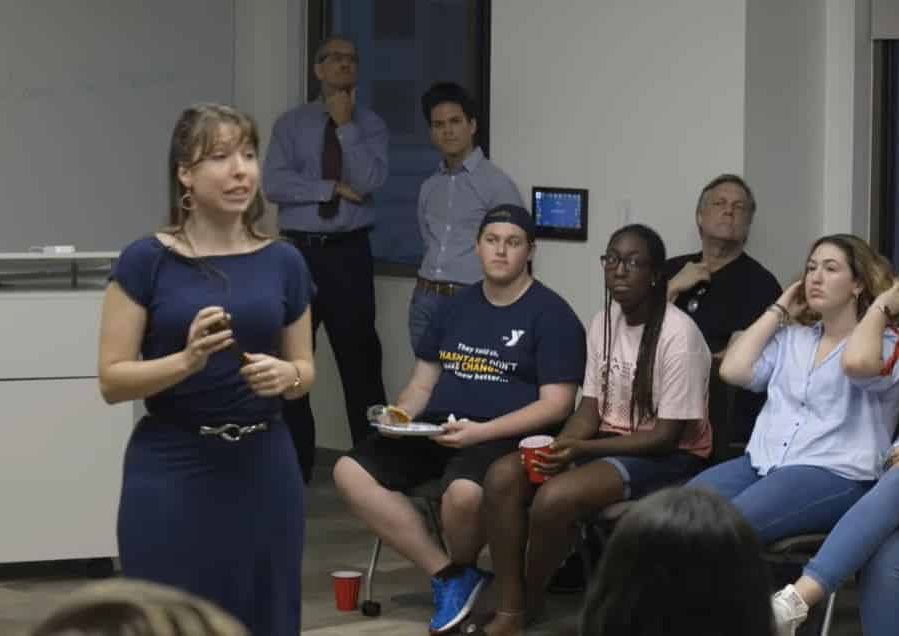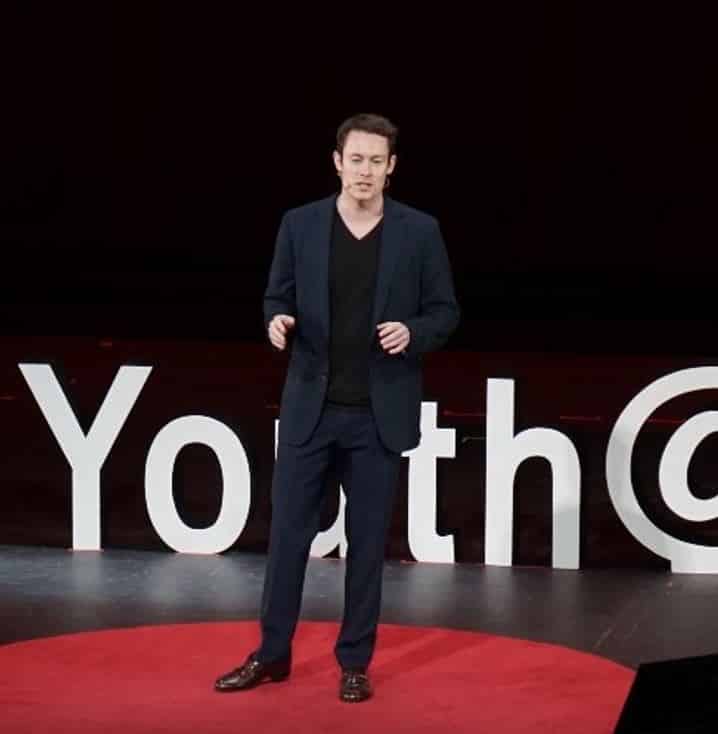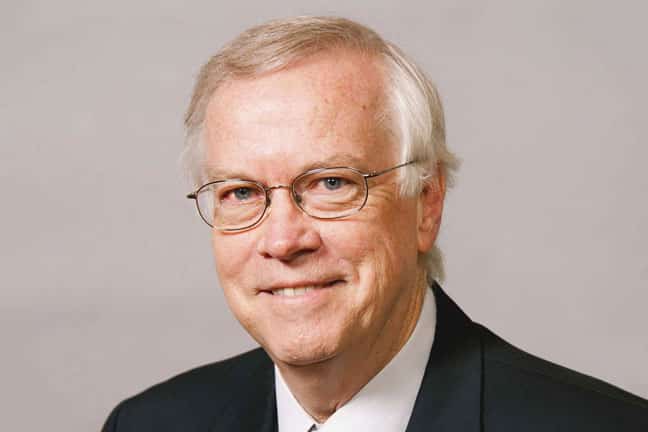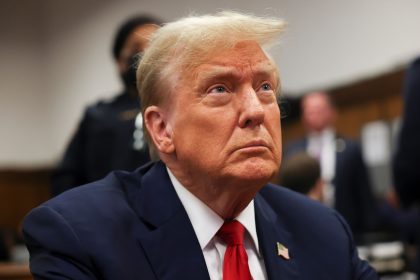Citizens Group Seeks to Bridge the Partisan Divide

WASHINGTON — All over Capitol Hill, the hullabaloo of the return to almost pre-pandemic normal was everywhere in evidence.
Under a bright blue late afternoon sky, mobs of rambunctious school children were being corralled on the Capitol steps for class pictures, while anxious members of Congress rushed by to attend to a last-minute vote.
Some staffers headed home, while others were just showing up after a long lunch or business that took them elsewhere in the district.
Meanwhile, something extraordinary was happening in Room 303 in the Cannon House Office Building.
Talking quietly amongst themselves were members of the Problem Solvers Caucus, the bipartisan group that espouses setting differences aside in the name of achieving lasting solutions to seemingly intractable problems.
As the members spoke, Bill Doherty, co-founder of a grassroots organization called Braver Angels, slowly drew them out. It wasn’t public policy he was interested in, but the life experiences that formed their values and inspired them to go into public service in the first place.
As they recounted their beginnings, a few members actually teared up a little and at one point one of them said, “it’s hard to hate someone when you know their heart.”
“This, in essence, is what we’re all about,” said Ciaran O’Connor, the Braver Angels chief marketing officer, a few days after the sessions.

“It’s sort of the first step in terms of building trust and relationships and bringing common values to the surface that they might not otherwise discuss,” he said.
“From there, of course, you hope they get down to the nitty gritty of seeing where they agree on specific policies,” O’Connor added.
Formed shortly after the 2016 election, Braver Angels has since grown into a national citizens movement, a nonprofit that is working to bring Americans together across the partisan divide.
“The goal is depolarization, and to build lines of trust and communication in what has become a very painfully divisive time,” O’Connor told The Well News from the organization’s headquarters in New York.
“When we got started in late 2016, our original workshop was based on traditional family therapy practices … and the goal was to help the two sides understand each other’s perspectives,” he continued.
“From there, we started expanding our program to include different kinds of workshops and training sessions and even debates, building local alliances across the country,” he said.
Today, Braver Angels boasts 11,000 members in nearly every state of the union. Initially, its focus was on citizen engagement, trying to turn down the volume of political rhetoric, calm the rancor that gripped the country after Trump v. Clinton, and bring citizens together through its programs, website and YouTube channel.
Recently, however, Braver Angels launched what it calls its Braver Politics program.
“Like its name implies,” O’Connor said, “it’s an effort to work specifically with politicians. So we’ve been working with candidates, elected officials and political staff, and the work we were doing on the Hill … was part of that initiative.”
“You know, there’s a lot of polarization out there right now, based not just on ideology, but also on attitudes,” he said. “It’s not just that we disagree, it’s that we think the other person is bad, evil and ill-intentioned.
“That’s why something like what we saw with the Problem Solvers is so important. Talking about life experiences humanizes people. Naturally, they start to see common values. And even if they continue to disagree, they can start to better understand why somebody feels the way they do.
“So this work that we’re doing. … It’s kind of taking things back to that human level and building trust. That’s the start of the work,” he said.
Braver Angels members pay monthly dues, starting at a dollar a month, and the organization boasts that most of its members are actively engaged in programs, rather than simply being passive supporters.
“A pretty significant percentage of them are volunteers, helping to grow the work,” O’Connor said. “They train to lead workshops and debates and get involved in a lot of different ways. Most people who are drawn to Braver Angels seem to view it as a commitment, rather than just subscribing to our email list.”
Asked why people are receptive to Braver Angels efforts, which involves a lot of opening up and a certain amount of vulnerability, O’Connor said it comes down to a couple of impulses.

“Some people are just sort of curious about the other side, and then there are other people who really want an opportunity to make their voice heard,” he said. “For instance, we have a debate program and I think the appeal of that is it allows people to debate specific hot button issues in a structured way.
“People have different reasons for joining. But at base, I think a lot of people are just sort of fed up with the current state of affairs, regardless of their ideology, and this is a way to sort of get involved and help make things better,” he said, adding, “I guess you can think of it as sort of an active citizenship.”
With its visit to Capitol Hill, Braver Angels has now piloted its Braver Politics program at all levels of government, from school boards to city halls to Congress.
“Now that we’re launching this as a nationwide thing, we’re encouraging people to reach out to their local officials and local candidates — given this is an election season — and ask them to hold discussions with voters and to participate in civilized debates,” O’Connor said.
“We’re also offering e-courses and stuff like that to provide politicians with skills for communicating with colleagues and constituents.”
O’Connor said while many people perceive their national representatives to be more polarized than local officials, the Braver Angels’ experience with the Problem Solvers Caucus showed there’s a ready audience on Capitol Hill for the organization’s message.
“What we found in the Problem Solvers Caucus was a strong, preexisting interest in doing bipartisan work. Our hope is that we can build out from there,” O’Connor said. “Ideally, we’d like to offer these workshops to every new member of Congress, as part of their orientation, so that we can spread our message a bit wider and work with people who might not otherwise be inclined to participate.
“But you have to start somewhere, and working with the Problem Solvers was a great experience for us,” he said. “I think we got a very positive reception from them and that we’ll definitely be doing more on the Hill in the future.”
Asked what Braver Angels would ultimately like to achieve there, O’Connor said, “It’s ultimately about changing norms, because the norms drive the culture.
“So with the Problem Solvers, we started with a coalition of the willing, but we’d love, down the road, to work with Ted Cruz and AOC,” he continued. “The important thing now, however, is to get a foothold and you do that by starting with people who are more inclined toward bipartisanship.”
Dan can be reached at [email protected] and @DanMcCue






















